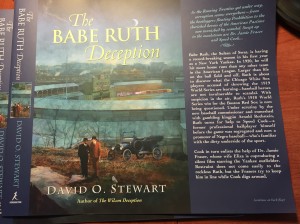Putting on the Show: Eight Rules for Book Talks

The cover for “The Babe Ruth Deception,” which will release on September 27.
One of the surprising parts of writing books, for me, has been the amount of performance involved — I mean performance: standing up and putting on a show.
My experience is, of course, framed by the kind of writer I’ve become. I’m “midlist,” which is a term that describes all the writers who fall between those who sell gazillions of books and those who can’t get their books published. Publishers expect midlist writers to go out and hustle the books.
They’d prefer that I started tweeting and Instagramming and built a huge online following. Or for me to have a cable TV show commanding millions of viewers. Or for my books to be made into major films or serialized TV shows. So far, none of those things has happened.
So what’s left is to slap me in front of a room to sing and dance (figuratively speaking). My standard gig is about 45 minutes with extra time for questions. Perhaps not surprising for an ex-trial lawyer, I enjoy putting on the show and the shows have been well-received. (If you want to reach your own decision on that claim, go to the pages on this website for individual books, where I’ve linked to some videos and podcasts; or hunt a couple up on YouTube.)
All this book-talking takes time. I have seventeen speaking dates set up for the last eleven months of 2016. The majority of those will address one of my two most recent books (Madison’s Gift and The Wilson Deception) but two will talk about earlier books and four are on unique subjects. And we haven’t even started booking events to promote my newest historical mystery, The Babe Ruth Deception, which will release on September 27.
Having done roughly two hundred of these shows, I herewith offer a few rules about them.
- Bring a LOT of energy to the show — Others may be able to do the low-key thing and get audiences to hang on every word. Not me. Before I start, I give myself a mental kickstart. No Jeb Bush. As we all know from being in audiences, it’s easy to drift into thoughts about the rest of your life, or even fall asleep (the ultimate punishment for a dull speaker). Demand their attention, politely.
- Distill, distill, distill — It can be difficult to figure out how to boil down a 100,000-word book. Do it. You can’t talk about everything, so figure out the most important things. When I prepared to talk about my first book, The Summer of 1787, I was surprised by how different the book seemed when I tried to boil it down. A book talk is not a recitation of the book. Leave a lot out.
- Be funny early — Figure out something funny to say in the first five minutes. Better yet, figure out several funny things to say early in your talk. Humor wakes people up. It gets them feeling good about you and about their decision to be in that room. Everyone likes to laugh.
- Tell them what they’re going to hear — We’ve all heard the truism about the three stages of an oral presentation: first you tell the audience what you’re going to tell them; then you tell them; then you tell them what you just told them. Sometimes truisms are true. This one is.
- Use images, pictures, maps — Powerpoint gets a bad rap these days as a crutch for the presenter, but when used well, it’s great! Pictures tell a lot. When I say that President Andrew Johnson had no sense of humor, a picture of the old sourpuss reinforces the point. When I want to get across how War I remade the map of Europe and the Middle East, nothing matches the map of 1914 showing the German Empire, the Austro-Hungarian Empire, the Russian Empire, and the Ottoman Empire; four years later, all were gone.
- Pay attention to the room — Read the audience. You can tell when they’re jumpy, when they’re bored. Body language tells you everything. Sometimes you may lose them. My worst experience was with a roomful of Citadel cadets who had been up and doing difficult things for fourteen hours before being forced to attend my talk. They were not interested. They were barely conscious. So I quit early and opened it up for questions. No need to prolong the agony.
- Don’t read from the book (unless it’s expected) — Reading from the book is tough to do well. There’s a tendency to drone, or rush, or just mess it up. It also takes your eyes off the audience (see previous rule) and has the potential to make you cringe in public when you read an unfortunate sentence that someone else must have fiendishly inserted in your book. Sometimes, though, audiences for fiction writers expect to be read to. In those cases, I always (i) keep it short, and (ii) edit the passage again so I won’t cringe in public.
- Stay out of most bookstores — Bookstores are among the best places in the world, but not for book talks. But unless it’s your “home” bookstore, or unless it’s a store that’s really really good at turning out some bodies, you’re going to get a small, disengaged group that won’t buy books. Much of the time, you’re better off home sending out tweets.
Very impressive.
David,
What great advice! As a would-be novelist, I hope someday to have occasion to follow it.
Cliff Fishman